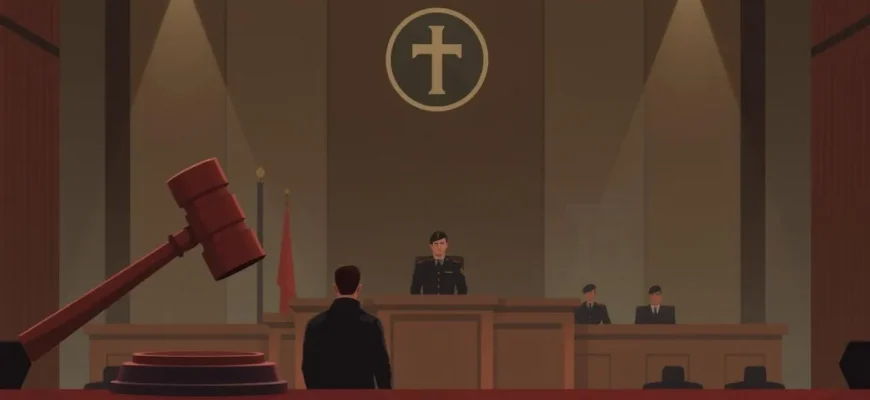Military tribunals have always been a fascinating subject for filmmakers, offering a blend of high-stakes drama, moral dilemmas, and intense action. This curated list of 10 action films delves into the world of military justice, where characters face not only the enemy but also the court of law. From historical epics to modern thrillers, these movies provide a thrilling look at the complexities of military law, the weight of command decisions, and the personal sacrifices made in the name of duty. Whether you're a fan of courtroom drama or adrenaline-pumping action, this collection promises to deliver both in spades.

The Caine Mutiny (1954)
Description: This film explores the court-martial of a naval officer accused of mutiny during World War II, offering a deep dive into the psychological pressures of command and the legal proceedings that follow.
Fact: The film was adapted from a Pulitzer Prize-winning novel by Herman Wouk, and Humphrey Bogart's performance earned him an Academy Award nomination.
 Watch Now
Watch Now 
Paths of Glory (1957)
Description: Stanley Kubrick's film about a French officer defending three soldiers accused of cowardice during World War I, showcasing the brutal reality of military tribunals and the futility of war.
Fact: The film was banned in France for nearly 20 years due to its portrayal of the French military.
 Watch Now
Watch Now 
The Bridge at Remagen (1969)
Description: While primarily a war film, it includes scenes of military tribunals and the consequences of command decisions, showcasing the tension between duty and survival.
Fact: The film was shot on location in Czechoslovakia, which was then behind the Iron Curtain.
 Watch Now
Watch Now 
Breaker Morant (1980)
Description: Set during the Boer War, this film follows the trial of three Australian officers accused of executing prisoners, highlighting the clash between military justice and the harsh realities of war.
Fact: The film was inspired by real events, and the character of Breaker Morant was based on an actual person, Harry 'Breaker' Morant.
 Watch Now
Watch Now 
A Few Good Men (1992)
Description: This film revolves around the court-martial of two U.S. Marines accused of murder, with Tom Cruise's character defending them against the backdrop of military culture and honor. It's a classic example of how military tribunals can expose deeper issues within the ranks.
Fact: The film was based on a Broadway play, and the iconic line "You can't handle the truth!" was improvised by Jack Nicholson.
 Watch Now
Watch Now 
The Thin Red Line (1998)
Description: This epic war film includes a subplot involving a military tribunal, exploring themes of guilt, responsibility, and the moral complexities of war.
Fact: The film features a large ensemble cast, with many actors having only brief appearances, reflecting the chaotic nature of war.
 Watch Now
Watch Now 
The General's Daughter (1999)
Description: This film involves a military investigation into the murder of a high-ranking officer's daughter, uncovering layers of military secrets and leading to a courtroom showdown.
Fact: The film was adapted from a novel by Nelson DeMille, and its plot was inspired by real events at Fort Bragg.
 Watch Now
Watch Now 
The Last Castle (2001)
Description: Robert Redford stars as a decorated general imprisoned in a military prison, where he leads a rebellion against the corrupt warden, leading to a dramatic military tribunal.
Fact: The film's title refers to the military prison, which is designed to look like a castle, symbolizing the fortress-like mentality of its inmates.
 Watch Now
Watch Now 
The Men Who Stare at Goats (2009)
Description: While not strictly a military tribunal film, it features a court-martial scene and explores the bizarre world of military experiments, offering a satirical take on military justice and unconventional warfare.
Fact: The film is based on a book by Jon Ronson, which claims to be a factual account of the U.S. Army's exploration into psychic abilities.
 Watch Now
Watch Now 
The Court-Martial of Billy Mitchell (1955)
Description: This film dramatizes the real-life court-martial of Brigadier General Billy Mitchell, who was tried for insubordination after criticizing the U.S. military's unpreparedness for aerial warfare.
Fact: Gary Cooper, who played Mitchell, was a World War I veteran himself, adding authenticity to his performance.
 30 Days Free
30 Days Free 








